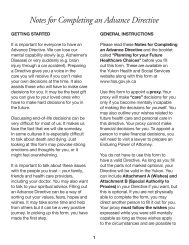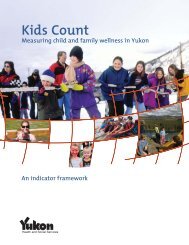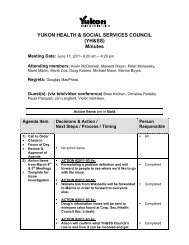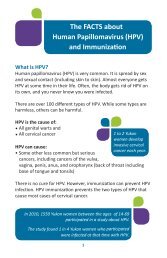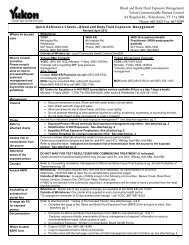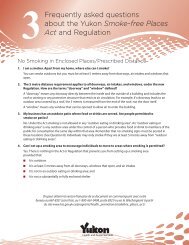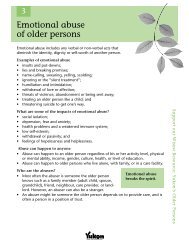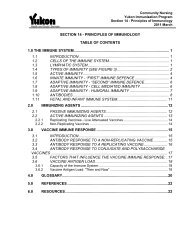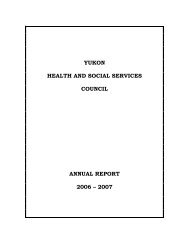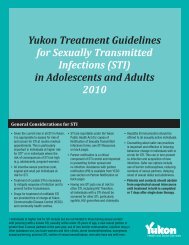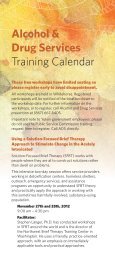Getting Your Drinking Water Tested - Health and Social Services
Getting Your Drinking Water Tested - Health and Social Services
Getting Your Drinking Water Tested - Health and Social Services
You also want an ePaper? Increase the reach of your titles
YUMPU automatically turns print PDFs into web optimized ePapers that Google loves.
<strong>Getting</strong> <strong>Your</strong> <strong>Drinking</strong> <strong>Water</strong> <strong>Tested</strong><br />
- Good Advice for Private Well Owners<br />
Why should you get your drinking<br />
water tested?<br />
<strong>Water</strong> for drinking, cooking, brushing teeth,<br />
washing dishes <strong>and</strong> other domestic uses<br />
should be from a safe water supply. This<br />
means that the water from your well should be<br />
free from microorganisms, like bacteria,<br />
viruses <strong>and</strong> protozoa (e.g., Giardia) that may<br />
cause disease. As well, chemicals should not<br />
be present at levels that may pose a health<br />
risk. Testing your well water gives you a<br />
better picture of your water quality, <strong>and</strong> tells<br />
you whether or not it is safe to drink.<br />
Just because your neighbour’s well water<br />
is safe does not mean your water is also<br />
safe. Sometimes, wells that are a few<br />
meters apart have totally different water<br />
quality. Differences in local surface <strong>and</strong><br />
underground geology (e.g., bedrock<br />
croppings), the depth of the well<br />
(e.g., shallow wells are more susceptible<br />
to surface water run-off), <strong>and</strong> well<br />
construction (e.g., casing may not be<br />
sealed) may mean that the quality of the<br />
drinking water from your well is not the<br />
same as that of your neighbour’s.<br />
What tests should be done <strong>and</strong> how often?<br />
Bacteriological testing<br />
Testing your drinking water for the presence of<br />
bacteria (i.e., total coliforms, E.coli) lets you know<br />
if your well is contaminated by disease-causing<br />
microorganisms. Contamination can come from<br />
many sources including the soil, farming, feces of<br />
warm-blooded animals (e.g., humans, dogs) or a<br />
malfunctioning septic system. A satisfactory test<br />
result means that evidence of contamination was<br />
not found in your water sample.<br />
New wells should be tested for bacteria<br />
<strong>and</strong> chemicals prior to use.<br />
Well water should be tested for the<br />
presence of bacteria at least once a year.<br />
Chemical testing<br />
Testing for the most common chemical <strong>and</strong> physical parameters likely to be found in drinking water in<br />
Yukon will give a good indication of the quality of your drinking water.<br />
Good quality water should meet the Guidelines for Canadian <strong>Drinking</strong> <strong>Water</strong> Quality for each parameter.<br />
A summary of these guidelines is available on the <strong>Health</strong> Canada web site – <strong>Water</strong> Quality <strong>and</strong> <strong>Health</strong> at<br />
http://www.hc-sc.gc.ca/hecs-sesc/water.<br />
Testing for the following 30 chemical <strong>and</strong> physical parameters is recommended:<br />
Physical Tests Dissolved Anions Total Metals<br />
Colour Alkalinity Aluminum Chromium Mercury<br />
Conductivity Chloride Arsenic Copper Potassium<br />
Dissolved Solids Fluoride Barium Iron Selenium<br />
Total Hardness Sulfate Boron Lead Sodium<br />
pH Nitrate Nitrogen Cadmium Magnesium Uranium<br />
Turbidity Nitrite Nitrogen Calcium Manganese Zinc<br />
You may want to include additional parameters if you suspect other chemicals may have contaminated<br />
your well. For example, hydrocarbons may be present as a result of a fuel spill.<br />
Initially, well water should be tested for common chemical <strong>and</strong> physical parameters over two<br />
consecutive years. If there are no concerns <strong>and</strong> there is no significant change in water chemistry from<br />
one year to the next, then tests can be done at five-year intervals.<br />
This h<strong>and</strong>out will be available in French.
Where can you get your drinking water tested?<br />
<strong>Water</strong> can be tested for bacteria, specifically total coliforms<br />
<strong>and</strong> E.coli, at the Environmental <strong>Health</strong> <strong>Services</strong> <strong>Water</strong><br />
Laboratory located at # 2 Hospital Road in Whitehorse.<br />
There is no cost for this service. You will need to make<br />
arrangements to obtain a proper sampling bottle <strong>and</strong> form<br />
with sampling instructions. This can be done by stopping by<br />
the office or calling (867) 667-8391 (toll-free 1-800-661-0408).<br />
Samples for bacteriological<br />
analysis must be kept cool<br />
(less than 10°C) but not frozen<br />
during storage <strong>and</strong> transit to the<br />
water laboratory, <strong>and</strong> delivered<br />
within 24 hours of collection!<br />
No Yukon laboratory tests for the chemical, physical <strong>and</strong> radiological parameters found in drinking<br />
water. <strong>Water</strong> can be tested for these parameters, in addition to bacteria, at accredited laboratories in<br />
British Columbia <strong>and</strong> Alberta, some of which are listed in the yellow pages under Laboratories –<br />
Analytical <strong>and</strong> Testing. The water laboratory you select will provide you with the appropriate sample<br />
bottle(s), form(s) <strong>and</strong> sampling instructions. You will incur costs for shipping <strong>and</strong> testing. The cost of<br />
testing for the 30 common parameters has been about $200 plus shipping.<br />
You may wish to hire a local business to collect your drinking water sample <strong>and</strong> have it tested.<br />
Environmental consulting <strong>and</strong> engineering firms are examples of the type of businesses that offer this<br />
service - most are listed in the yellow pages.<br />
What should you do if there is a problem with your drinking water?<br />
Total Coliforms <strong>and</strong> E.coli<br />
Total coliforms are bacteria that can be found everywhere in the environment. Their presence in a<br />
drinking water sample may be a result of problems in the well (e.g., cracked casing, improper seal<br />
around wellhead) or distribution system, or improper collection of the sample. Next steps include resampling<br />
to confirm results <strong>and</strong> checking for the possible source of contamination. Often disinfection<br />
of the well will address the problem. Information on disinfection is available from Environmental<br />
<strong>Health</strong> <strong>Services</strong>. In some cases, remedial work on the well or installation of a water treatment system*<br />
may be required.<br />
The presence of E. coli indicates recent contamination of your<br />
drinking water from human or animal feces, which in turn<br />
may cause serious acute (e.g., diarrhea) <strong>and</strong> long-term health<br />
problems. When E.coli is present, you are advised to boil your<br />
water prior to drinking, brushing teeth, food preparation, etc.,<br />
or use an alternate supply, such as bottled water.<br />
Although your drinking water may<br />
look, taste <strong>and</strong> smell fine, it may<br />
still have bacteria or chemicals that<br />
can cause health problems.<br />
Arsenic <strong>and</strong> Uranium<br />
Long-term consumption of well water with an excess<br />
of arsenic or uranium can cause health problems.<br />
Therefore you should consider measures to remove<br />
or reduce these levels to acceptable concentrations<br />
(i.e., water treatment system*) or use an alternate<br />
drinking water supply (e.g., trucked water delivery,<br />
bottled water, a new well).<br />
Yukon is rich in mineral deposits, so it is<br />
not surprising that our ground water may<br />
contain chemicals, such as arsenic <strong>and</strong><br />
uranium, that exceed the Guidelines for<br />
Canadian <strong>Drinking</strong> <strong>Water</strong> Quality.<br />
*Where appropriate, treatment options should be explored with a reputable water system supplier. <strong>Water</strong><br />
treatment system components should be certified (e.g., CSA, NSF, UL). Costs will vary with the type of<br />
treatment technology needed. Some suppliers are listed in the yellow pages under <strong>Water</strong> Purification &<br />
Filtration Equipment.<br />
What Can I Do if I Have More Questions?<br />
Contact Environmental <strong>Health</strong> <strong>Services</strong> at # 2 Hospital Road, Whitehorse, Yukon Y1A 3H8<br />
Phone 867-667-8391 • Toll Free at 1-800-661-0408 ext.8391 • Fax: 867-667-8322<br />
Environmental.health@gov.yk.ca<br />
April 20, 2005


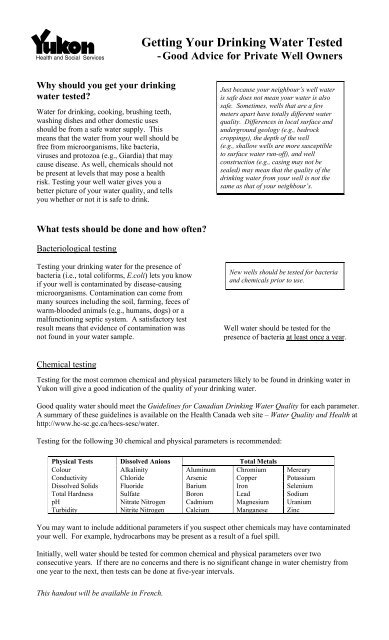
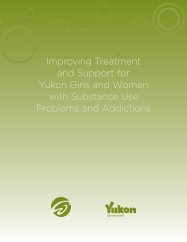
![Women and Alcohol: A women's health resource [2326.26 KB ]](https://img.yumpu.com/22340649/1/190x245/women-and-alcohol-a-womens-health-resource-232626-kb-.jpg?quality=85)
